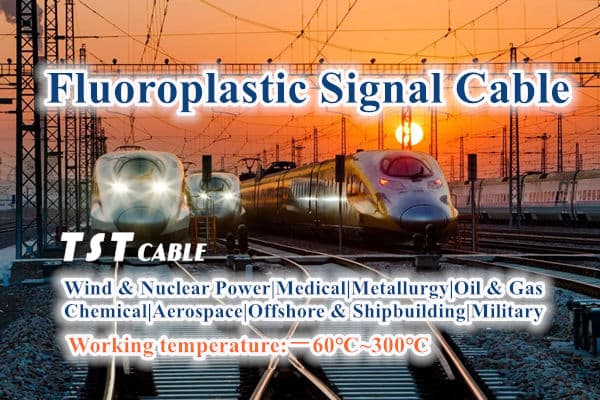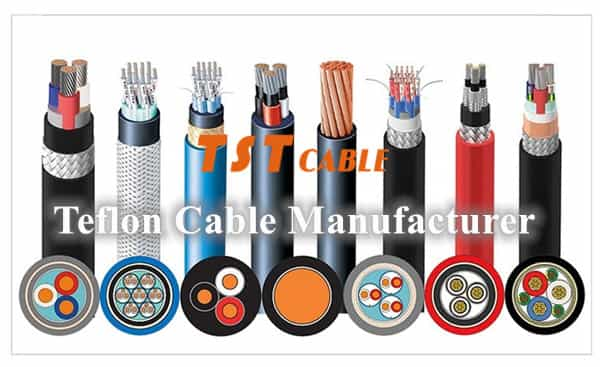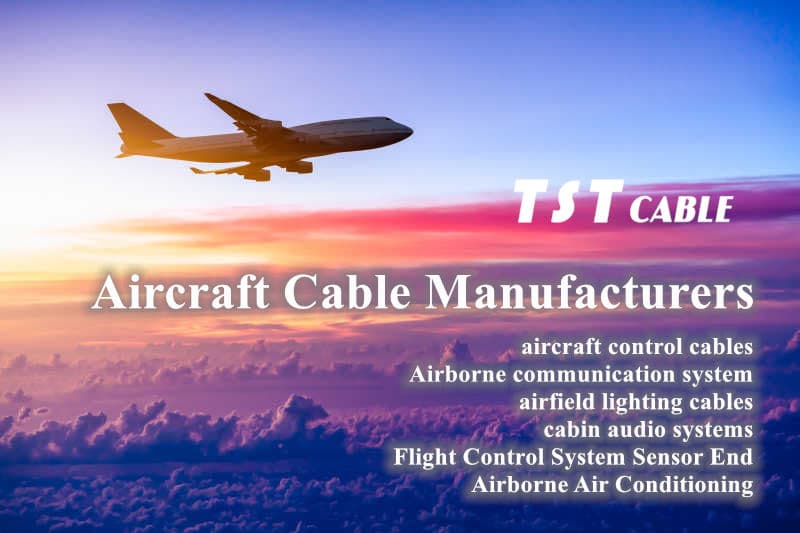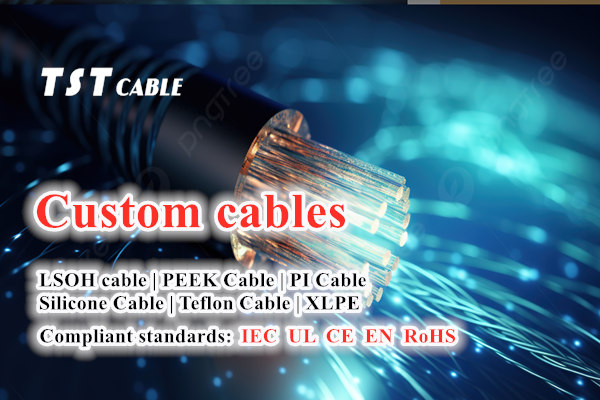
This article mainly introduces the characteristics, application scenarios, installation and maintenance precautions of fluoroplastic cables, Teflon cables, AFF/AFFB/AFPF cables. Let’s take a look!
Introducing the characteristics, application scenarios, installation and maintenance precautions of fluoroplastic cables, Teflon cables, AFF/AFFB/AFPF.
Teflon cable (fluoroplastics) AFF cable/AFFB cable/AFPF cable are a type of wire and cable specially designed for high temperature, chemical corrosion, high mechanical strength requirements and flame retardant occasions. This type of cable uses fluoroplastics as insulation and sheath materials. Fluoroplastics (such as FEP, PFA, PTFE, etc.) have excellent chemical stability, heat resistance, weather resistance and electrical insulation properties, and are suitable for multiple industries such as electricity, metallurgy, chemical industry, petroleum, aviation, etc.
Product name: Teflon high temperature cable AFF/AFFB/AFPF (fluoroplastic cable)
Conductor: tinned/silver-plated copper wire
Insulation: FEP, PFA Teflon (fluoroplastic)
Sheath: FEP, PFA Teflon (fluoroplastic)
B stands for: flat cable
P stands for: shielding
Temperature range: -160℃~ 200℃/250℃ (TST cables custom cable temperature range: -190℃~1200℃)
Rated voltage: 300V/500V/600V
Outer diameter tolerance: ±0.1mm
Color: white-blue-red-black-brown-yellow-green-transparent-yellow-green
Features of Teflon cable AFF/AFFB/AFPF cable
High temperature resistance: The maximum operating temperature that AFF/AFFB/AFPF cable can withstand can reach 180°C to 260°C, depending on the type of fluoroplastic used.
Chemical corrosion resistance: Fluoroplastic insulation has good resistance to most acids, alkalis, and solvents, and is suitable for use in chemical reactors, laboratories, and other environments.
Flame retardancy: Fluoroplastic materials have natural flame retardant properties and are not easy to burn even at high temperatures, which helps to slow the spread of fire in the event of a fire.
Radiation resistance: The polymer structure of fluoroplastics gives them strong radiation resistance, making them suitable for use in nuclear energy, medical equipment, and other fields.
Mechanical strength: AFF/AFFB/AFPF cables have good wear resistance and bending resistance, and are suitable for environments with frequent movement or high mechanical stress.
Electrical properties: The low dielectric constant and low dielectric loss of fluoroplastics give AFF/AFFB/AFPF cables excellent high-frequency signal transmission capabilities, making them suitable for use in communications, data transmission, and other fields.
Long life: Due to their excellent physical and chemical stability, AFF/AFFB/AFPF cables usually have a longer service life than ordinary cables.
Teflon cable AFF/AFFB/AFPF cable application scenarios
Product use: used in various mobile motors, steel, aviation, power plants, petrochemicals with AC rated voltage of 300V/500V/600V and below, suitable for use in high temperature environments such as outdoor lighting.
High temperature environment: heating furnaces and steelmaking workshops in the metallurgical industry; catalytic cracking units and high-temperature pipelines in the petrochemical industry; generator windings and transformers in the power industry.
Chemical corrosion environment: reactors, pumping stations, and tank connections in chemical plants; clean rooms and laboratories in the pharmaceutical industry.
Aviation and military: wires and cables in aircraft, ships, satellites and other equipment require lightweight, high temperature resistant, and flame retardant materials.
Nuclear power plants: Due to the radiation resistance of fluoroplastics, AFF/AFFB/AFPF cables are suitable for power transmission and signal control around nuclear reactors.
Teflon cable 300V/500V/600V voltage rating
The nominal 300V/500V/600V voltage rating of AFF/AFFB/AFPF cables means that they are designed for use in power systems with a maximum working voltage of 300V/500V/600V. This is generally applicable to medium and low voltage distribution systems, control circuits, signal transmission lines, etc., and can meet the electrical requirements in most industrial applications.
When selecting Teflon cables AFF/AFFB/AFPF cables, the specific conditions of the working environment, including factors such as temperature, chemical exposure, mechanical stress, and the required electrical properties should be considered to ensure that the performance of the cable matches the application. In addition, the manufacturer’s guidance and relevant safety standards should also be followed during installation and maintenance to ensure the normal operation and service life of the cable.
Special application scenarios of Teflon cables AFF/AFFB/AFPF cables
1. Extreme temperature environment
In extremely cold or hot environments, AFF/AFFB/AFPF cables are an ideal choice due to their excellent temperature adaptability. Whether it is a research station in the Arctic or an oil rig in the desert, these cables can maintain stable working performance.
2. Marine and underwater applications
Marine engineering, deep-sea exploration, underwater robots and other fields have extremely demanding requirements for cables. AFF/AFFB/AFPF cables are not only resistant to seawater corrosion, but also can maintain electrical performance under high-voltage environments, making them ideal for connecting underwater equipment.
3. Food and pharmaceutical industries
Food processing and pharmaceutical manufacturing processes have extremely high requirements for sanitary conditions. AFF/AFFB/AFPF cables are widely used in these industries because of their smooth surface, low fouling and easy cleaning.
4. Aerospace
Aerospace vehicles have limited internal space and face challenges such as extreme temperatures, radiation and vibration. AFF/AFFB/AFPF cables are the first choice for internal wiring of aircraft, satellites, rockets and other spacecraft with their light weight, high temperature resistance, radiation resistance and good mechanical properties.
Teflon cable AFF/AFFB/AFPF cable installation and maintenance points
1. Bending radius
AFF/AFFB/AFPF cables should avoid excessive bending during installation to avoid damaging the insulation layer. Follow the minimum bending radius recommended by the manufacturer to ensure the integrity and long-term performance of the cable.
2. Environmental factors
Although AFF/AFFB/AFPF cables have excellent chemical and temperature resistance, care should be taken to avoid contact with strong corrosive substances and direct radiation from high-temperature sources during installation to extend the life of the cable.
3. Fixing and support
Proper fixing and support are essential for the normal operation of the cable. Clamps and brackets made of non-corrosive materials should be used to ensure that the cable remains stable after installation and reduce mechanical stress.
4. Regular inspection
Perform regular visual inspections of the cable to pay attention to signs of wear, cracks or other damage. At the same time, monitor the electrical properties of the cable, such as resistance, insulation resistance, etc., to detect and deal with potential problems in a timely manner.
Teflon cable AFF/AFFB/AFPF cable has demonstrated unparalleled advantages in many fields due to its unique properties. However, correct selection and reasonable use are the key to maximize its effectiveness. In the process of design, installation and maintenance, full consideration of the working environment and application requirements, and following professional guidance and standard operating procedures will ensure the long-term stable operation of AFF/AFFB/AFPF cables and provide reliable solutions for power transmission and signal control under various complex working conditions.
Frontier applications and future trends of Teflon cables AFF/AFFB/AFPF cables
1. New energy and electric vehicles
With the rapid growth of the new energy vehicle market, AFF/AFFB/AFPF cables have become ideal connection materials for key components such as electric vehicle battery management systems, motor drive systems, and charging facilities due to their lightweight, high temperature resistance, and oil resistance. In the future, with the continuous advancement of electric vehicle technology, the performance requirements for cables will continue to increase, and AFF/AFFB/AFPF cables will continue to play an important role.
2. Renewable energy
In renewable energy power generation systems such as solar and wind power, cables must not only withstand extreme weather conditions, but also have excellent weather resistance and mechanical strength. These characteristics of AFF/AFFB/AFPF cables make them an ideal choice for connecting photovoltaic panels, wind turbines and other equipment. With the popularization of renewable energy, the demand for cables will continue to grow, and AFF/AFFB/AFPF cables are expected to be more widely used.
3. Smart Manufacturing and Industry 4.0
Smart factories and automated production lines have higher requirements for the flexibility and data transmission capabilities of cables. AFF/AFFB/AFPF cables can not only meet the needs of high-speed data transmission, but their durability and anti-interference also make them the preferred choice in the field of smart manufacturing. In the future, with the development of industrial Internet of Things, AFF/AFFB/AFPF cables will play a greater role in data acquisition, remote monitoring, etc.
4. Biomedicine and Health Technology
In biomedical research and health monitoring equipment, cables need to be in direct contact with the human body, and there are strict requirements on the biocompatibility and non-toxicity of materials. AFF/AFFB/AFPF cables are gradually used for signal transmission and power supply inside medical equipment due to their good chemical stability and biosafety.
Teflon cable AFF/AFFB/AFPF technology research and development innovation direction
Environmentally friendly material development: explore more environmentally friendly fluoroplastic formulas, reduce the use of harmful substances, and improve the recyclability and biodegradability of materials in response to the global trend of green manufacturing.
Performance optimization: By improving the polymer structure and additives, the temperature resistance, chemical resistance, mechanical strength and other properties of the cable are further improved to meet the higher requirements of cables in future application fields.
Intelligent integration: Integrate intelligent components such as sensors and microprocessors into the cable to realize the functions of cable status monitoring and fault warning, and improve the intelligence level of the cable system.
Teflon cable supplier–AFF/AFFB/AFPF cable manufacturer–TST cables
The Teflon cable (AFF cable/AFFB cable/AFPF cable) independently developed by TST cables has shown broad application prospects in many fields due to its unique performance advantages. With the continuous advancement of science and technology and changes in market demand, the research and development and application of AFF/AFFB/AFPF cable will continue to expand new boundaries and bring more efficient, safer and smarter solutions to industries such as industry, medical care and energy.
TST cables Teflon cable combines high temperature resistance, corrosion resistance and excellent electrical performance. Relying on exquisite craftsmanship and rigorous testing, every meter of cable carries safety and trust, and is your first choice for industrial applications.
In the future, TST cables’ AFF/AFFB/AFPF cables will not only be carriers of power and signal transmission, but also bridges connecting technology and life, helping human society develop in a greener, smarter and more sustainable direction.
If you are looking for a stable, high-standard Teflon cable supplier, AFF/AFFB/AFPF cable manufacturer, please feel free to email or call our engineers to discuss your needs and confusions, and you can also get free samples.
Also available in:
English




